Meet the Texas Bird that is a Bulwark for Biodiversity
Saving the endangered golden-cheeked warbler will help us protect an abundance of plants and animals in the Texas Hill Country.
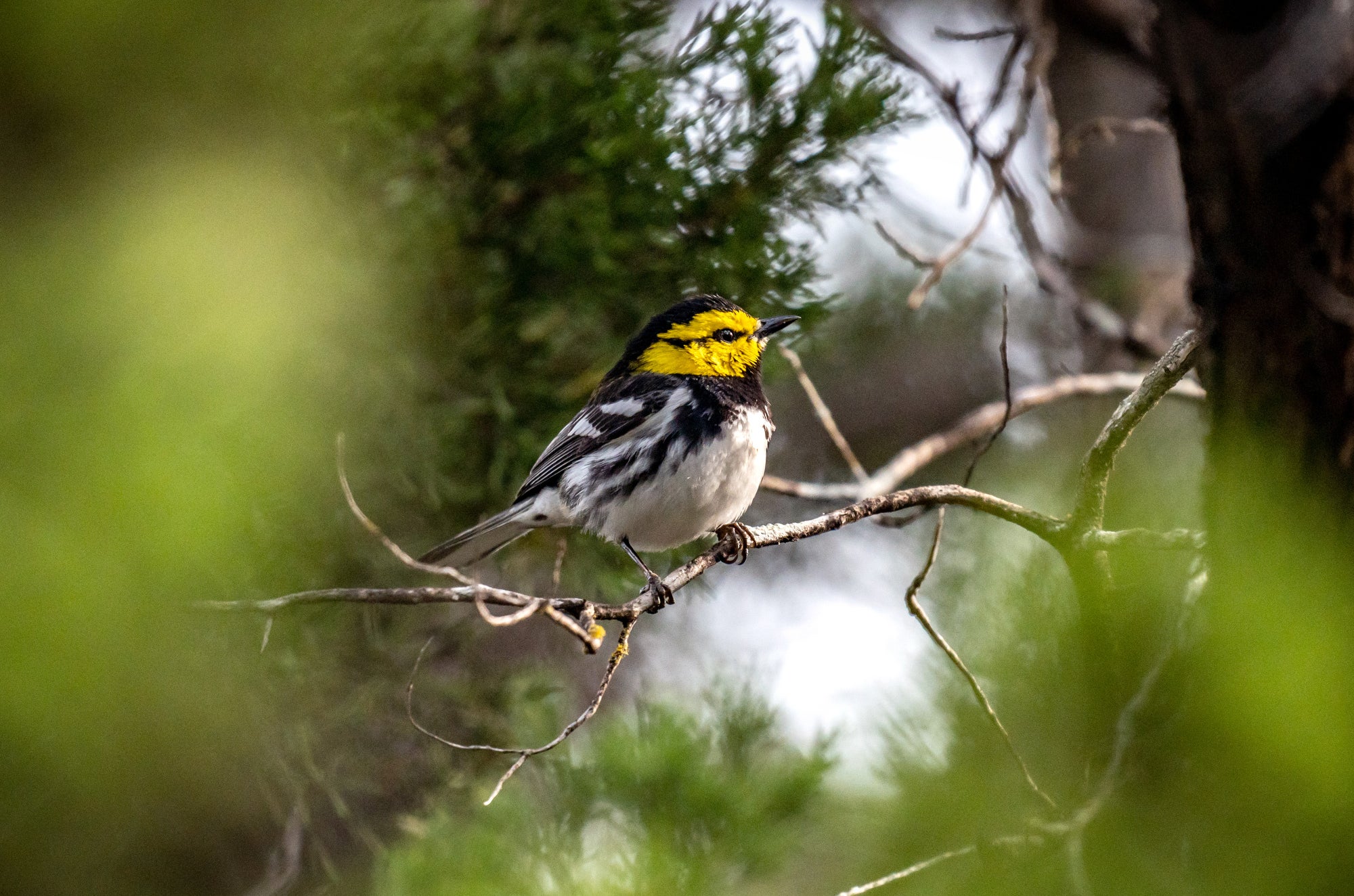
This page was published a year ago. Find the latest on Earthjustice’s work.
Editor’s Note
Litigation update (Sept. 10, 2024): A court has ordered the U.S. Fish and Wildlife Service to reconsider a petition to delist the Golden Cheeked Warbler. The bird, native only to Texas, remains protected while the Service reconsiders the delisting petition and works to finalize a five-year review of the warbler’s status. Meanwhile, a growing body of scientific evidence shows that the warbler faces mounting threats from factors including land development and climate change. Earthjustice is closely monitoring the government’s stewardship of the warbler and stand ready to go back to court to maintain protections for this iconic bird.
The Texas Hill Country is one of the most biologically diverse regions in the country. Earthjustice and our partners’ efforts to protect a cheeky bird aim to maintain that biodiversity.
This swathe of central Texas stretches roughly from the bat refuges of Austin to the east, the historic Alamo of San Antonio to the south, and the Rio Grande border with Mexico to the west.
The lifeblood of the region lies below its rolling hills. The Edwards Aquifer, one of the most prolific artesian aquifers in the world , feeds numerous crystal-clear springs including Barton Springs and San Marcos Springs. This vital water source provides drinking water for the fast-growing cities, where the outer rings of Austin and San Antonio are beginning to converge . The water also supports an abundance of species like the Ashe juniper, Texas blind salamander, Guadalupe bass, and endangered golden-cheeked warbler.
It’s the golden-cheeked warbler’s protections under the Endangered Species Act that in many ways serve as a last line of defense for species across the Hill Country. Named for the striking yellow markings on its head, the warbler is the only bird to breed exclusively in the state of Texas. Its habitat overlaps with that of numerous other sensitive and imperiled species in the region. Like many biodiverse ecoregions across the U.S., the warbler’s central Texas habitat is under threat from sprawling development and climate change.
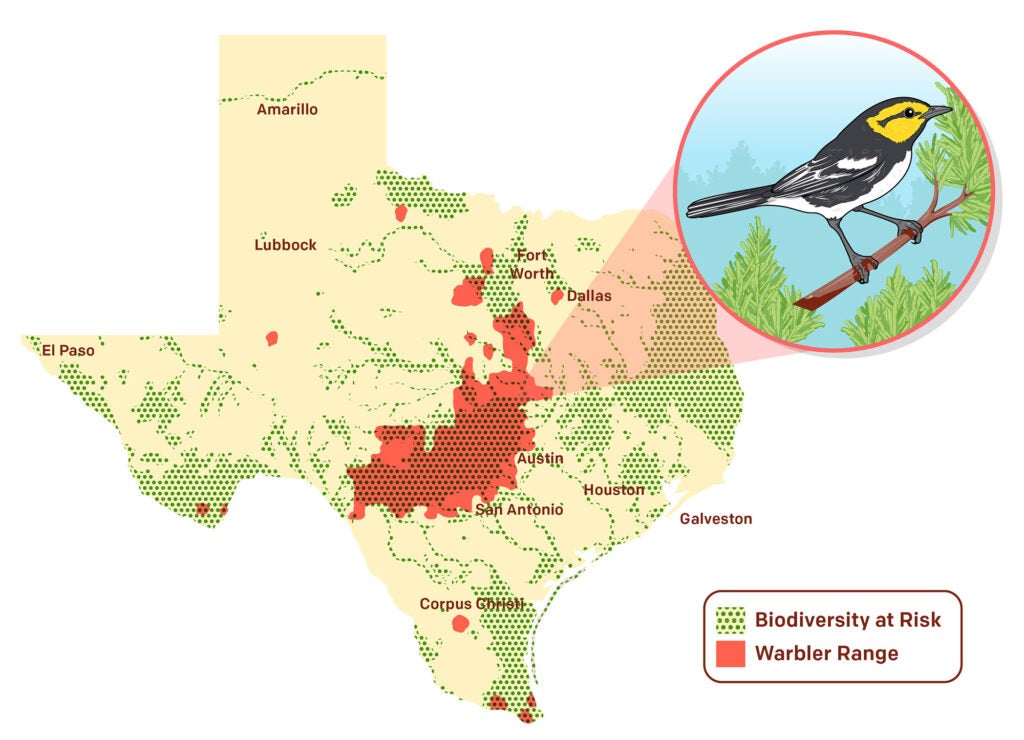
(Kate Francis / Brown Bird Design; Sources: ebird.org, New York Times, NatureServe)
Protections for the Hill Country and other biodiverse ecoregions across the country are essential to combat the worsening extinction crisis. Habitat loss is the largest driver of biodiversity loss worldwide. Bird populations in the United States and Canada have already declined by nearly 30% over the past half-century — a loss amounting to a staggering 2.9 billion breeding adult birds. According to a report released by NatureServe this year, over one-third of biodiversity in the U.S. is at risk of disappearing. The report found that 34% of plants and 40% of animals are at risk of extinction, while 41% of ecosystems are at risk of range-wide collapse.
The forces driving these losses threaten to unravel the web of life that sustains so many species on this planet — including us. The same natural systems that make life possible for other creatures also make life possible for humans. Natural systems filter pollutants to provide clean air and water, protect soil quality, and provide pollination and pest control for agriculture.
The warbler’s fate is inextricably tied to biodiversity and human welfare in Central Texas, says Bill Bunch, executive director with Austin-based Save Our Springs Alliance.
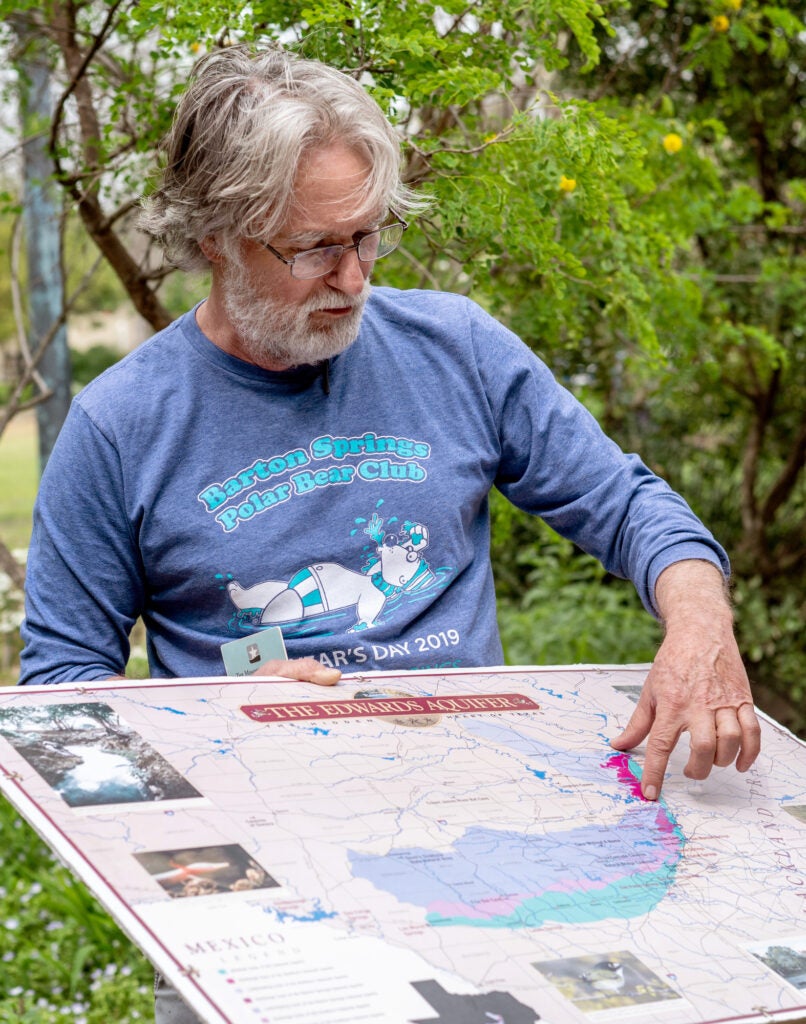
Bill Bunch, executive director of Austin-based Save Our Springs Alliance, discusses the Edwards Aquifer with members of Earthjustice’s Biodiversity team in Austin, Texas. (Sergio Flores for Earthjustice )
“The warbler’s range really tracks the Hill Country. If we’re protecting the habitat for the bird, we’re protecting the watershed for the Edwards Aquifer, which is more vulnerable to pollution than any other aquifer in Texas,” says Bunch.
The aquifer, the springs, and a network of caves above the aquifer are a unique subterranean ecosystem which hosts dozens of endemic species — i.e., those found nowhere else on Earth. Furthermore, Bunch notes, the Edwards Aquifer is the sole source of drinking water for millions of people.
“So, if we protect the warbler, we’re protecting all of these other species and the water supply,” says Bunch.
Save Our Springs was founded in 1992 to protect the Edwards Aquifer, its springs, and the surrounding ecosystem. Last year, it enlisted Earthjustice’s help to fight off an effort led by a conservative litigation and policy outfit, the Texas Public Policy Foundation, to remove the golden-cheeked warbler from the federal list of endangered species. The foundation currently represents the Texas General Land Office in litigation seeking delisting.
In recent months, the warbler has faced attacks on multiple fronts, as Texas Representative Ellen Troxclair has also advanced a bill in the state legislature to strip protections for the Ashe juniper tree, which the birds rely on for survival.
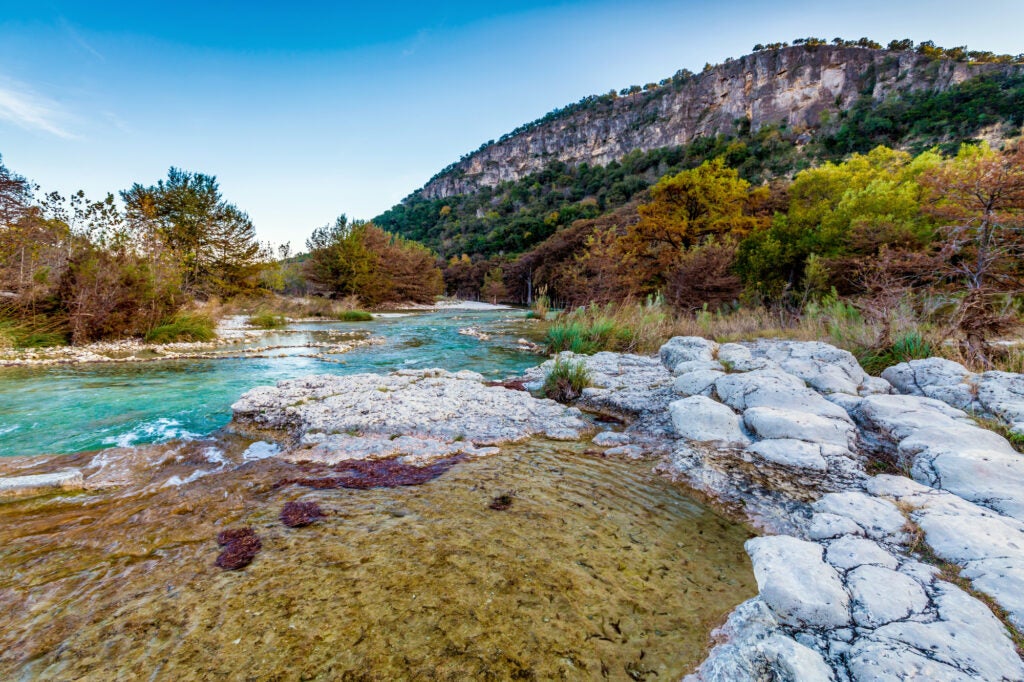
The Frio River runs through Garner State Park in Texas Hill Country. (Richard McMillin / Getty Images)
“The main driver of the delisting effort has been the Texas Public Policy Foundation, which is a rightwing think tank that stands up for ‘property rights,’” says Bunch. “They’ve been able to raise quite a bit of money by attacking government regulation of any kind, but they’ve especially drawn their fire onto the Endangered Species Act.”
In late 2022, Earthjustice sent a letter on behalf of Save Our Springs and eight other groups to the U.S. Fish and Wildlife Service, detailing the ongoing threats to the warbler and urging the agency to maintain protections for the species. The service is currently conducting a five-year status review for the warbler to ensure it has the appropriate level of protection under the Endangered Species Act. The service is required to base its determination on the best available scientific data. Bunch says that “the science shows that, if anything, the threats to the habitat and the survival of the species are growing rather than subsiding.”
Earthjustice Senior Associate Attorney Sharmeen Morrison authored the letter to Fish and Wildlife Service and is spearheading the organization’s effort to protect the species.
“The golden-cheeked warbler deserves an impartial status review that takes into account the best available science,” Morrison says. “Development interests cannot run roughshod over the Endangered Species Act. We are confident that the science will show that the warbler must remain protected.”
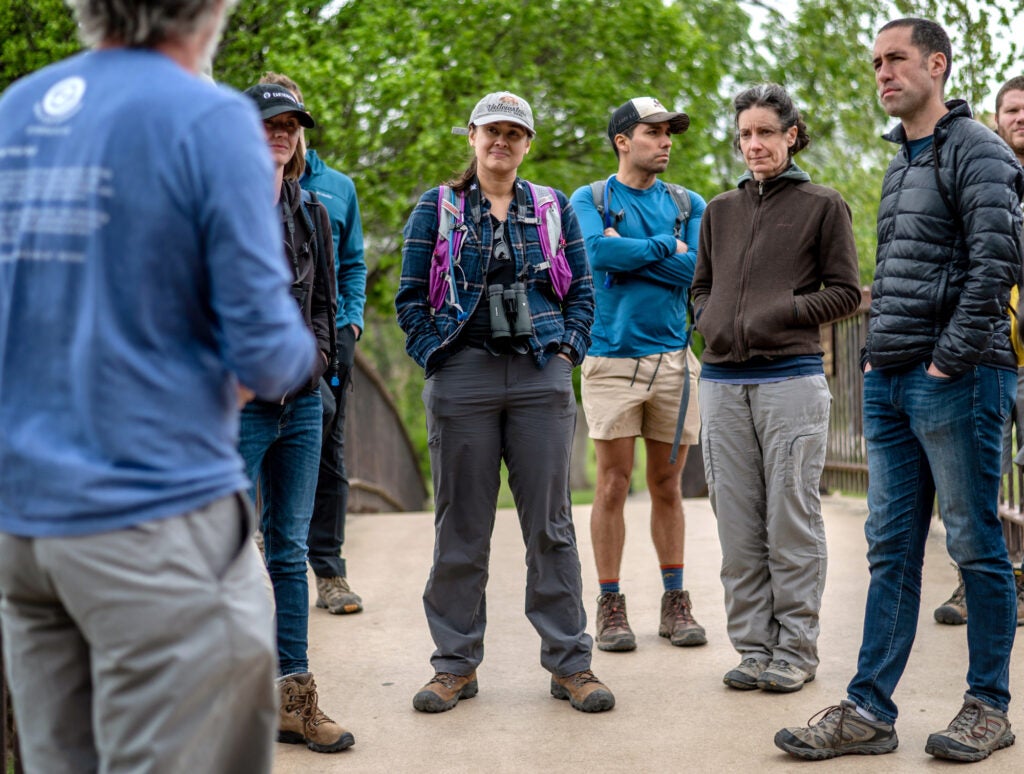
Earthjustice attorneys Elizabeth Forsyth, Sharmeen Morrison and Rodrigo Cantú, litigation paralegal Jessica Hann and attorney Scott Stern, left to right, listen to Bill Bunch, far left, executive director with Austin-based Save Our Springs Alliance, during an outing in Austin, Texas on March 28, 2023. (Sergio Flores for Earthjustice )
In the coming months, the service will make its initial determination on golden-cheeked warbler protection moving forward. As awareness of the worsening biodiversity crisis grows, Bunch hopes those in and outside of the state are prepared to fight for this special Texas bird.
“It is the only species of bird that is 100% Texan — every warbler is born in Texas and it’s the only species of bird that can say that,” he says. “I feel like we owe other species the blessing of sharing this place, rather than displacing them as we consume the planet. People may want to someday come visit to see the birds and where they live. It’s a beautiful part of the country.”
Earthjustice, Save Our Springs, and our partners will continue fighting to ensure it stays that way.
Originally published on April 18, 2023.
The Biodiversity Defense Program fights to reshape our relationship to lands, water, and wildlife everywhere by confronting the major drivers of the decline in nature, including habitat destruction and over-exploitation of wildlife.